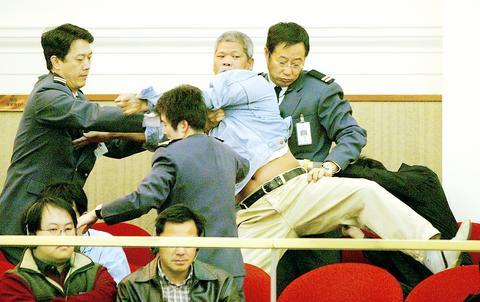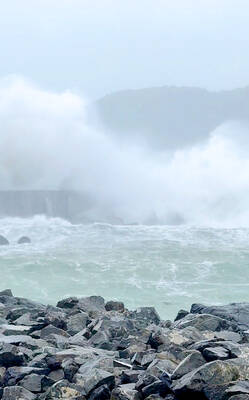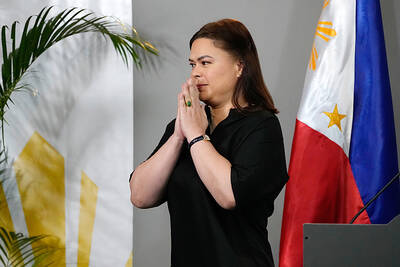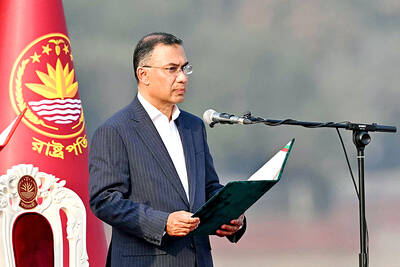Pro-democracy groups lashed out at Hong Kong's government yesterday, accusing Chief Executive Tung Chee-hwa (董建華) of kowtowing to China over political reforms and "totally disregarding" public opinion.
Campaigners demanding a swift transition to full democracy in the territory received a stinging setback on Wednesday, after Tung skirted around the issue in his annual policy address.

PHOTO: REUTERS
Tung revealed in his address that he had consulted China's rulers over any political reforms in the territory and announced the setting up of a task force charged with addressing Beijing's concerns.
The move infuriated pro-democracy campaigners, saying the decision to consult Beijing threatened Hong Kong's autonomy under its post-1997 constitution.
Lawmaker Lee Cheuk-ywan said Tung's failure to issue a timetable for reform showed he was "hopelessly out of touch" with public sentiment in Hong Kong, where hundreds of thousands of protesters have rallied in recent months.
"The speech did not offer one concrete measure to address the demands of the people who turned out on July 1 and the New Year's Day rally calling for direct elections for the chief executive and a timetable for change, not one," Lee fumed.
Tung's failure to address public demands and the confirmation that Beijing will be consulted first on reforms "shows Beijing's views are far more important than those of the public," Lee added.
China hailed Tung's address as "reliable and feasible," and took the unusual step of issuing a statement after the speech emphasizing that any changes to Hong Kong's constitution must be cleared by Beijing.
The statement drew fierce criticism from the pro-democracy camp. Democratic Party chairman Yeung Sum said the move was a huge blow and a major "snub to the wishes of the public."
"The announcement has left a black cloud hanging over constitutional reform. We can't believe Tung said the issue of whether we can or cannot have universal suffrage in Hong Kong needs to be first cleared by Beijing," Yeung said.
"That [statement] has put a brake on the move toward full democracy."
Hong Kong university analyst Sonny Lo said Tung's decision had further worsened the chief executive's credibility, who has seen his popularity plunge over the SARS crisis last year and proposed security legislation.
More than 500,000 protesters rallied last July to denounce the Beijing-backed security bill, which critics said would curtail freedoms and rights, forcing Tung to withdraw the legislation indefinitely.
"If the government consults with Beijing first on reforms, there is a real risk Hong Kong could undermine its own autonomy under `one country two systems,'" Lo said.
"Tung has to be careful not to do this ... but the government is politically sandwiched between the demands of one country and those of two systems," Lo added.
The pro-democracy camp wants the government and Beijing to commit to a firm timetable for implementing reforms.
This would include direct elections of Hong Kong's next leader by 2007 and the legislature a year later, the earliest dates permitted under the city's post-1997 constitution.
Tung, selected by an 800-member election committee loyal to Beijing, currently heads a legislature in which only 30 of the 60 seats are directly elected -- ensuring pro-government lawmakers dominate.

Heavy rain and strong winds yesterday disrupted flights, trains and ferries, forcing the closure of roads across large parts of New Zealand’s North Island, while snapping power links to tens of thousands. Domestic media reported a few flights had resumed operating by afternoon from the airport in Wellington, the capital, although cancelations were still widespread after airport authorities said most morning flights were disrupted. Air New Zealand said it hoped to resume services when conditions ease later yesterday, after it paused operations at Wellington, Napier and Palmerston North airports. Online images showed flooded semi-rural neighborhoods, inundated homes, trees fallen on vehicles and collapsed

‘COST OF DEFECTION’: Duterte’s announcement could be an effort to keep allies in line with the promise of a return to power amid political uncertainty, an analyst said Philippine Vice President Sara Duterte yesterday announced she would run for president of the Southeast Asian nation of 116 million in 2028. Duterte, who is embroiled in a bitter feud with Philippine President Ferdinand Marcos Jr, was impeached last year only to see the country’s Supreme Court throw the case out over procedural issues. Her announcement comes just days before her father, former Philippine president Rodrigo Duterte, begins a pretrial hearing at the International Criminal Court (ICC) in the Netherlands over crimes against humanity allegedly committed as part of a brutal crackdown on drugs. “I offer my life, my strength and my future

NOT YET THERE: While the show was impressive, it failed to demonstrate their ability to move in unstructured environments, such as a factory floor, an expert said Dancing humanoid robots on Monday took center stage during the annual China Media Group’s Spring Festival Gala, China’s most-watched official television broadcast. They lunged and backflipped (landing on their knees), they spun around and jumped. Not one fell over. The display was impressive, but if robots can now dance and perform martial arts, what else can they do? Experts have mixed opinions, with some saying the robots had limitations and that the display should be viewed through a lens of state propaganda. Developed by several Chinese robotics firms, the robots performed a range of intricate stunts, including martial arts, comedy sketches and choreographed

POST-UPRISING: Bangladesh Nationalist Party lawmakers were yesterday expected to formally elect Tarique Rahman as their leader and new head of government Bangladesh’s prime minister-to-be Tarique Rahman and lawmakers were yesterday sworn into parliament, becoming the first elected representatives since a deadly 2024 uprising. Rahman is set to take over from an interim government that has steered the country of 170 million people for 18 months since the autocratic government of Sheikh Hasina was overthrown. The lawmakers, who promised loyalty to Bangladesh, were sworn in by Chief Election Commissioner AMM Nasir Uddin. Bangladesh Nationalist Party (BNP) lawmakers are expected to formally elect Rahman as their leader, with President Mohammed Shahabuddin then to administer the oath of office to the prime minister and his ministers